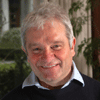Laboratory of Yeast Genetics and Cell Biology

Paul Nurse, Ph.D.
President Emeritus
Professor
Laboratory of Yeast Genetics and Cell Biology
Paul.Nurse@rockefeller.edu
Dr. Nurses research focuses on the molecular machineries that control cell division and cell shape. Using the fission yeast Schizosaccharomyces pombe as a model system, his laboratory studies the cell cycle and cell morphogenesis controls operative in eukaryotic cells. His major past contribution was the codiscovery of cyclin-dependent kinase (CDK) as the key regulator molecule controlling S phase and mitosis, findings that have had implications for understanding cell reproduction, cell growth, development and cancer.
Present work in the Nurse laboratory is in three areas: the cell cycle, cell form and genomic studies. Research on the cell cycle has included controls acting over S phase. The Nurse lab has mapped all the replication origins in fission yeast and has found that they are used similarly during both the mitotic and meiotic S phases, although with differing efficiencies. Origin efficiency varies greatly with more efficient origins generally being initiated early in S phase. The ORC proteins, which form a landing pad for other DNA replication proteins at origins, bind the efficient origins early in the cell cycle, and as a consequence these origins compete more effectively for other later-associating DNA replication proteins. This provides an explanation for the temporal order of origin firing during S phase. When DNA replication stalls, the subsequent mitosis is blocked because the DNA replication initiation factor Cdc18 (Cdc6 in other organisms) forms a complex on chromosomes together with checkpoint protein kinases. These then signal to the cell that mitosis should not take place. A cell geometry sensing mechanism that can monitor cell size has been revealed based on a Pom1 gradient along the length of the cell. This mechanism regulates CDK activation at the onset of mitosis.
Dr. Nurses recent work on cell form has shown that microtubules making up the cells cytoskeleton become organized along the long axis of the cell by kinesin motor mediated microtubular sliding. This long axis organization can occur without microtubular organizing centers, showing that the microtubules self-organize de novo along the length of the cell. A key problem in cell biology is what determines the size and shape of membrane-bounded organelles. The nucleus in a fission yeast cell varies in size proportionally to the size of the cell. In contrast, DNA content has no effect on nuclear size, suggesting that there is a control mechanism that maintains nuclear size in direct relation to cellular size.
Recent genomic studies have generated a resource whereby every gene in the fission yeast genome has been individually deleted. The Nurse lab is using this resource to characterize all the genes necessary for cell viability and for various cell functions including progression through the cell cycle, generation of cell form, cell size and nuclear shape and size.
CAREER
Dr. Nurse, a native of the United Kingdom, graduated from Birmingham University in 1970 and received his Ph.D. in cell biology and biochemistry from the University of East Anglia in 1973. He did postdoctoral work at universities in Bern, Switzerland, Edinburgh, and Sussex, and joined the Imperial Cancer Research Fund (ICRF) in London in 1984. In 1988 he moved to the University of Oxford as chair of its department of microbiology, and he returned to ICRF in 1993 as director of research. He became director general in 1996 and in 2002 was appointed chief executive of Cancer Research UK, formed when ICRF merged with the Cancer Research Campaign. He moved his laboratory to the United States upon being named president of Rockefeller University in 2003. He is also director of the Anderson Center for Cancer Research at Rockefeller.
Dr. Nurse is a member of The Royal Society and a foreign associate of the U.S. National Academy of Sciences. He received The Royal Societys Royal and Copley Medals and the Legion of Honor in 2002 and the Nobel Prize in Physiology or Medicine in 2001. In 1999 he was honored with knighthood in Great Britain for services in cancer research and cell biology and since 2000 has been a member of CST advising the UK Prime Minister on science and technology.
